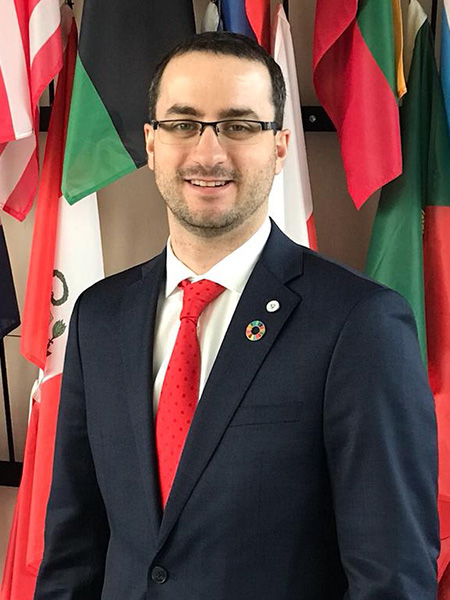AAE alum Pons selected as IAF "Young Space Leader"
Arnau Pons, who recently received his Ph.D from AAE, was chosen by the International Astronautical Federation for the Young Space Leaders Recognition Programme.
The program recognizes exceptional students and young professionals who demonstrate leadership in their academic or early careers. IAF “Young Space Leaders” were selected by a committee of IAF members and revealed during the spring meeting. Criteria included contributing to astronautics through academic or professional activities; reaching out to other young people and to communities to share knowledge and experience; engaging colleagues in the international space community; and contributing to the work of IAF committees or volunteering in support of other Federation activities.

Pons (PhD AAE ’20) has been heavily involved in the Space Generation Advisory Council, including being the chair in support of the United Nations Program on Space Applications, co-chair, interim chair, treasurer, financial comptroller, Space Generations Congress (SGC) manager and SGC deputy congress manager.
Since 2016, he also has been a member of the IAF Space Propulsion Committee, and since 2019, he has been on the IAF Workforce Development Young Professionals Program Committee. As part of the IAF Propulsion Committee, Pons led the establishment of a joint session between the IAA and IAF for Small Satellite Propulsion Systems.
“I am deeply honored to be recognized by the International Astronautical Federation with the Young Space Leaders 2020 Award together with a stellar group of space colleagues and fellow SGAC members,” said Pons, an operations research analyst at NATO Supreme Allied Commander Transformation in Norfolk, Va. “I would like to express my utmost gratitude to the Purdue AAE, my advisor Professor William Anderson, the Space Generation Advisory Council and International Astronautical Federation for their unwavering support.
“Purdue has been a lifting platform that allowed me to learn, gain new skills, connect with the international space community and provided me a launchpad from which to aim for the stars.”
As a “Young Space Leader,” Pons will mentor new students and young professionals to join the IAF and succeed in the space community, he said. One of the long-term goals is to find a way to provide resources in terms of awards and scholarships for students and young professionals from under-represented space nations so they can attend IAF events, specifically the International Astronautical Conference.
He’ll continue to be involved with the IAF workforce and propulsion committees. His tenure as chair of the SGAC will end in March 2021, and he’ll then join the Advisory Board for one term.
Pons first discovered the SGAC in 2013, when he became a member while studying in China.
The SGAC, an international network of members, volunteers and alumni that represents more than 150 countries, aims to represent university students and young space professionals ages 18-35 to the United Nations, space agencies, industry and academia.
Pons has held a variety of roles. As chair, a two-year position elected by regional coordinators, he has led the official representation of the organization at events and meetings, provided strategic decision-making and direction for the organization and developed and executed the organization’s short- and long-term strategic plan, among other responsibilities.
“I have no words to describe how much SGAC has changed my life,” he said. “I have been very fortunate to make lifelong friends, learn and grow from a myriad of experiences and different perspectives, and overall, I have enjoyed every minute working together with our passionate SGAC members from all over the world. I am deeply grateful for having being part of SGAC since 2015.
“During my years at SGAC, I have had the honor to work with many previous Chairs, three Executive Directors, the Regional Coordinators, Executive Committee and Teams of SGAC to contribute to the progress of SGAC. We have accomplished many things together. I wish that all together we achieve for SGAC to be a community that empowers students and young professionals from all around the globe to pursue their dreams in the space sector, a platform that promotes strong international collaboration and a beacon of hope that makes a positive impact for humanity.”
While in AAE, Pons conducted high-fidelity computational fluid dynamics simulations to study combustion instabilities in liquid rocket engines for the U.S. Air Force Center of Excellence on Multi-Fidelity Modeling of Rocket Combustion Dynamics.
He has authored 12 conference papers, including six presented during IAC meetings, one NASA report, two journal articles and contributed to several research reports and presentations about combustion instabilities in liquid rocket engines presented to the U.S. Air Force Office of Scientific Research and the Air Force Research Lab.
